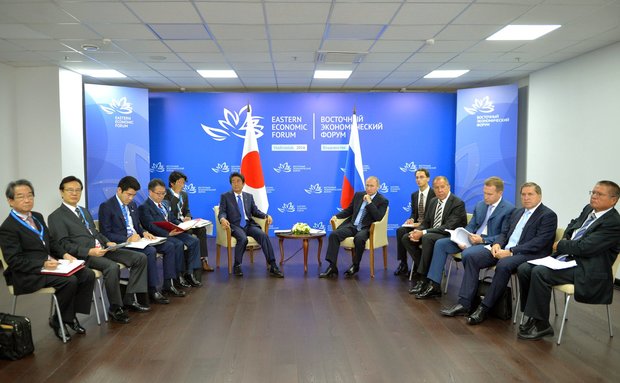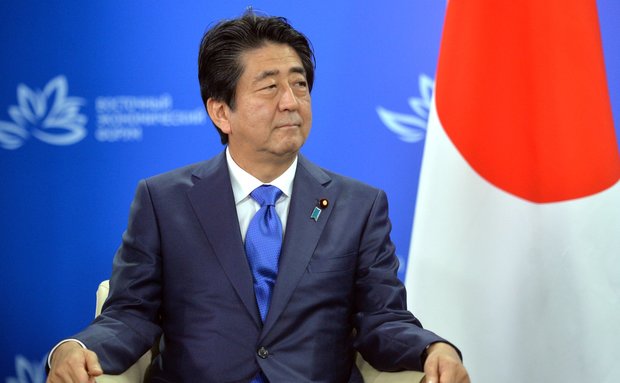‘Neither Japan nor the West in the face of the USA wants the degradation of Russia to the level of a marginal state’
The columnist of Realnoe Vremya believes that the Land of the Rising Sun in relations with our country is trying to apply the principle of Chinese ‘soft power’
The President of Russia Vladimir Putin and the Prime Minister of Japan Shinzō Abe met last week in Vladivostok. Within the scope of the Eastern Economic Forum the two countries signed an agreement on cooperation in the field of development of small and medium enterprises. According to the famous orientalist scholar Larisa Usmanova, the long-standing issue of the Kuril Islands is unlikely to be resolved in the near future. However, Japan is ready to step forward and become an economic partner of Russia.
'The logic of the cold war still exists in the Russian-Japanese relations'
Another meeting of the President of Russia Vladimir Putin and the Prime Minister of Japan Shinzō Abe is a logical continuation of the cohesion policy with Russia that started after the visit of Abe to Russia.
The unresolved territorial issue is unlikely to affect the rating of the ruling party and the Prime Minister himself. This problem is long-standing and it is impossible to solve it at once. It is clear that any progress in this matter in the direction of return of the Islands to Japan will make the participants of this process the national heroes. However, throughout the postwar history there is no any politician who would succeed in this. The current Prime Minister of Japan is also a pragmatist and he is unlikely to expect a quick solution. However, in my opinion, the current policy of Abe is not just populist. The Prime Minister does really intend to move the matter forward.
The thing is that the logic of the cold war, which is largely from the Russian side, still exists in the Russian-Japanese relations.

'Another meeting of the President of Russia Vladimir Putin and the Prime Minister of Japan Shinzō Abe is a logical continuation of the cohesion policy with Russia that started after the visit of Abe to Russia.' Photo: kremlin.ru
'In respect of the other partners we use either the logic of double standards or the logic of strategic partnership'
In respect of the other partners we use either the logic of double standards, like in the case with Ukraine and the Crimea territorial belonging issue, or the logic of a strategic partnership, like in the case with China: it is beneficial for us to be friends with China and that is why we are making territorial concessions in the alignment of boundaries along the Amur River and are ready to give for a lease the lands in Transbaikal.
The current behavior of the Japanese is easy to understand. If Russia meets China halfway, why not try to change the format of relations with Japan, if Japan is also become a serious economic partner or make serious concessions, at least in the issue of a partial non-support of the policy of sanctions announced by the West to Russia.
'Neither Japan nor the West in the face of the USA wants the degradation of Russia'
If we proceed from the pragmatic point of view aiming at a very distant historical perspective, we should explain to the population and to understand ourselves — what will we gain as a result of improved relations with Japan?

'It is a very important ideological and political move towards each other, as well as in solving the territorial dispute between our countries. In this sense, the current policy of Abe, openly demonstrating a desire to solve it — a significant step forward.' Photo: kremlin.ru
Let's consider the main negative argument 'Japan is a friend of the USA'. But America is not our enemy today like it was during the cold war, when the notorious territorial issue in Russian-Japanese relations arose. It turns out that Japan is not our enemy. We have differences — exactly the same as in the relations with the Western countries and the United States. And if we are talking about the cooperation with the West and America, why can't we talk about cooperation with Japan? In my opinion, it is a very important ideological and political move towards each other, as well as in solving the territorial dispute between our countries. In this sense, the current policy of Abe, openly demonstrating a desire to solve it — a significant step forward.
The Japanese understand that: the current Russia is not an economic superpower, not the second political force in the world, Russia and Japan do not live in a time of difficult ideological cold war. Neither Japan nor the West in the face of the USA wants the degradation of Russia to the level of a marginal state. We have already missed the chances provided by the fourth industrial revolution. We are not a communist state, we have no ideological differences by definition. We have an inefficient economy that our leadership cannot make effective. Maybe Japan will help us? Not for the islands. But for the full-scale long-term strategic cooperation, during which the transfer of the four islands will be resolved by itself.
Reference
Larisa Usmanova, the specialist in Oriental studies, regional studies, a specialist-sociologist.
- Doctor of Social Sciences (the thesis 'The Türk-Tatar Diaspora in Northeast Asia, Transformation of Consciousness. A Historical and Sociological Account Between 1898 and the 1950s', 2006).
- PhD in Political Science (the thesis 'Security in Northeast Asia: the Shanghai cooperation organization, 2003).
- Candidate of Pedagogical Sciences (the dissertation 'The formation and development of communication abilities of a journalist in new information environments', 1999).
- In 1992 graduated from the Kazan State University, The Department of Journalism.
- 1992-1996 — postgraduate study in the Kazan State University, the Department of Pedagogy.
- 2001-2003 — Aoyama Gakuin University, Department of International Politics and Economics, master's degree, International relations. Qualification: sociologist and the specialist in International Affairs (global processes).
- 2003-2006 – Shimane Prefecture University, Department of regional studies of Northeast Asia, doctoral study, sociology. Qualification: a regional studies specialist (international law)-sociologist.
- Speaks Japanese, English and French.